Charles E W Bean, Diaries, AWM38 3DRL 606/261/1 - 1929 - 1930 - Part 9
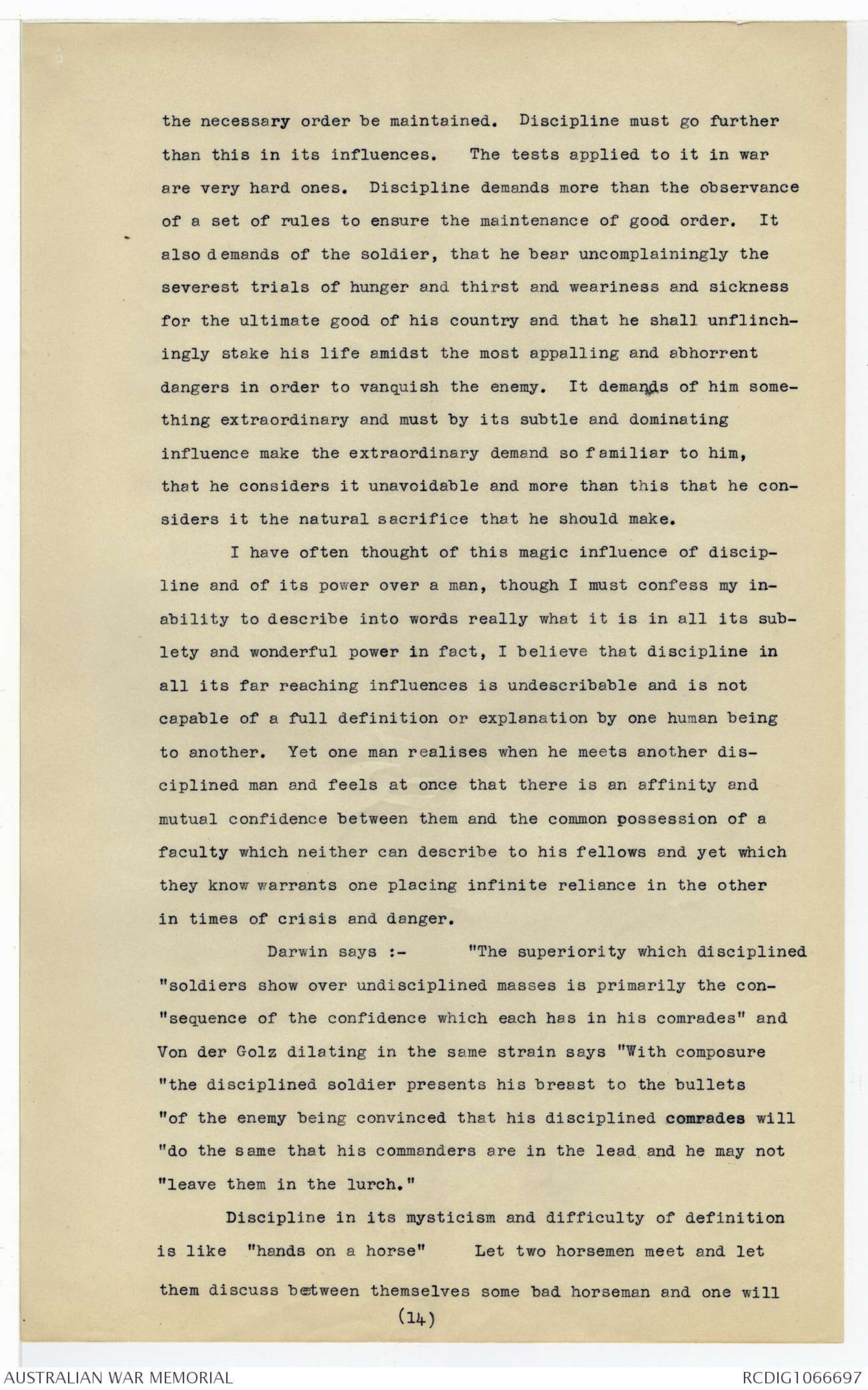
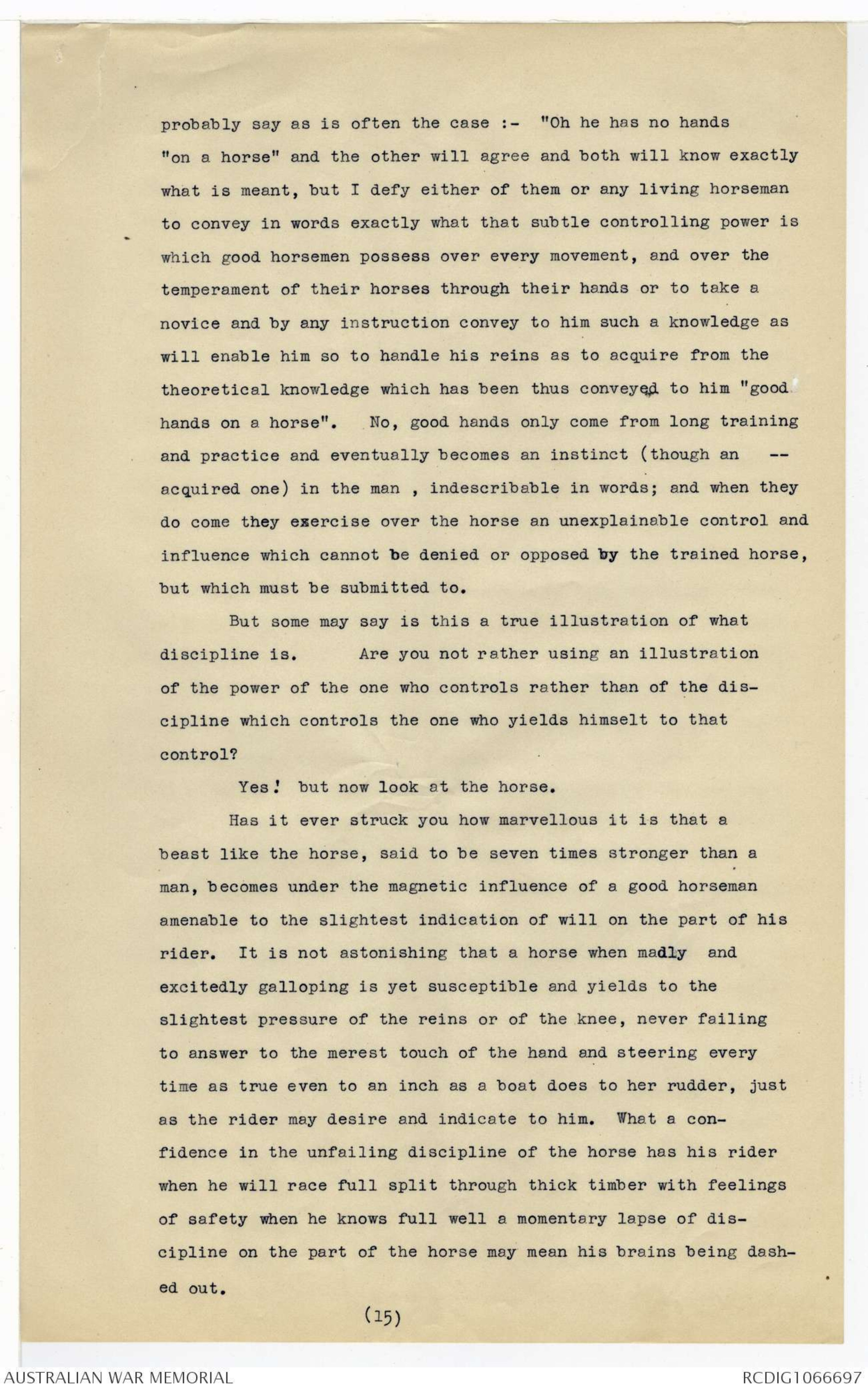
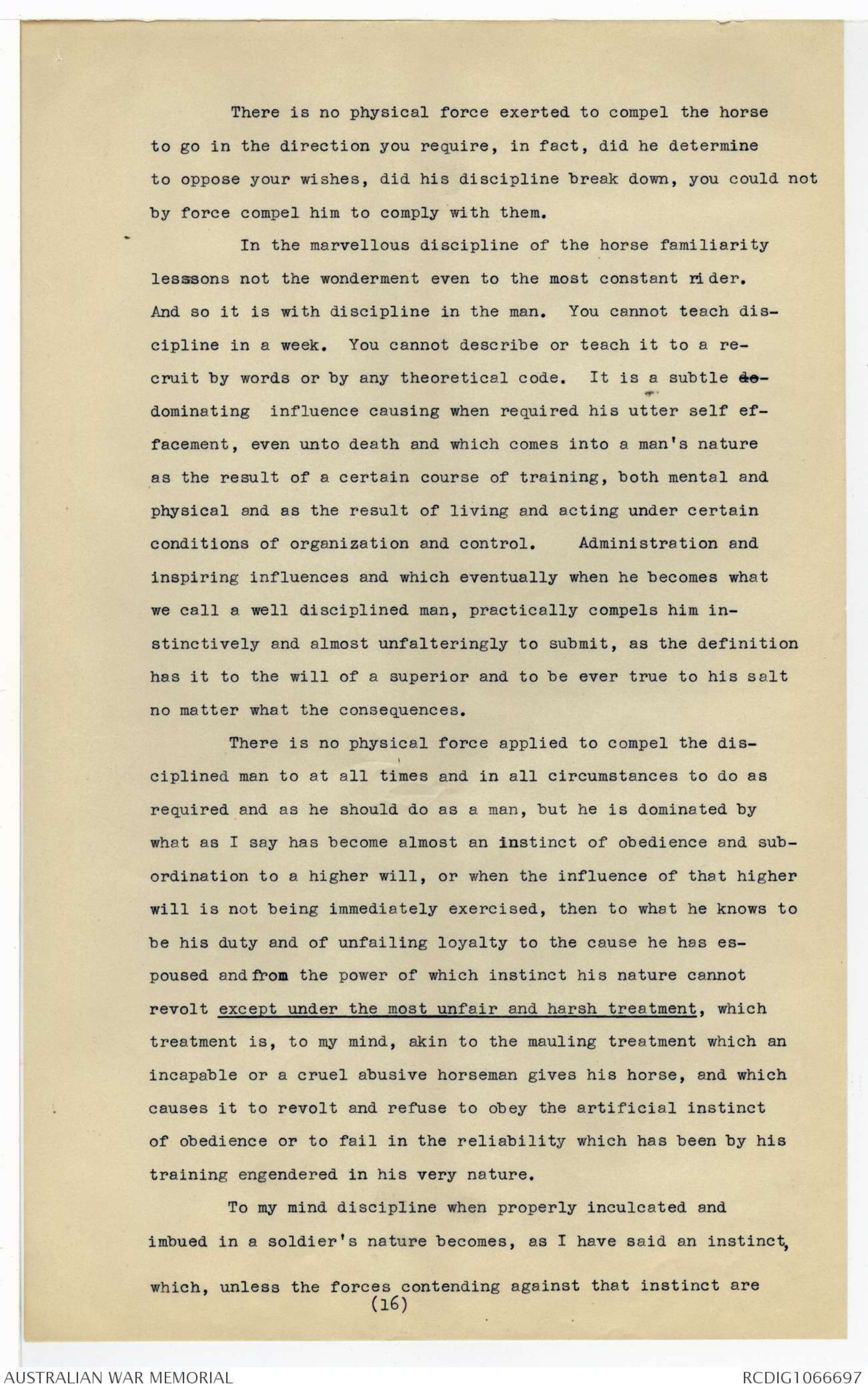
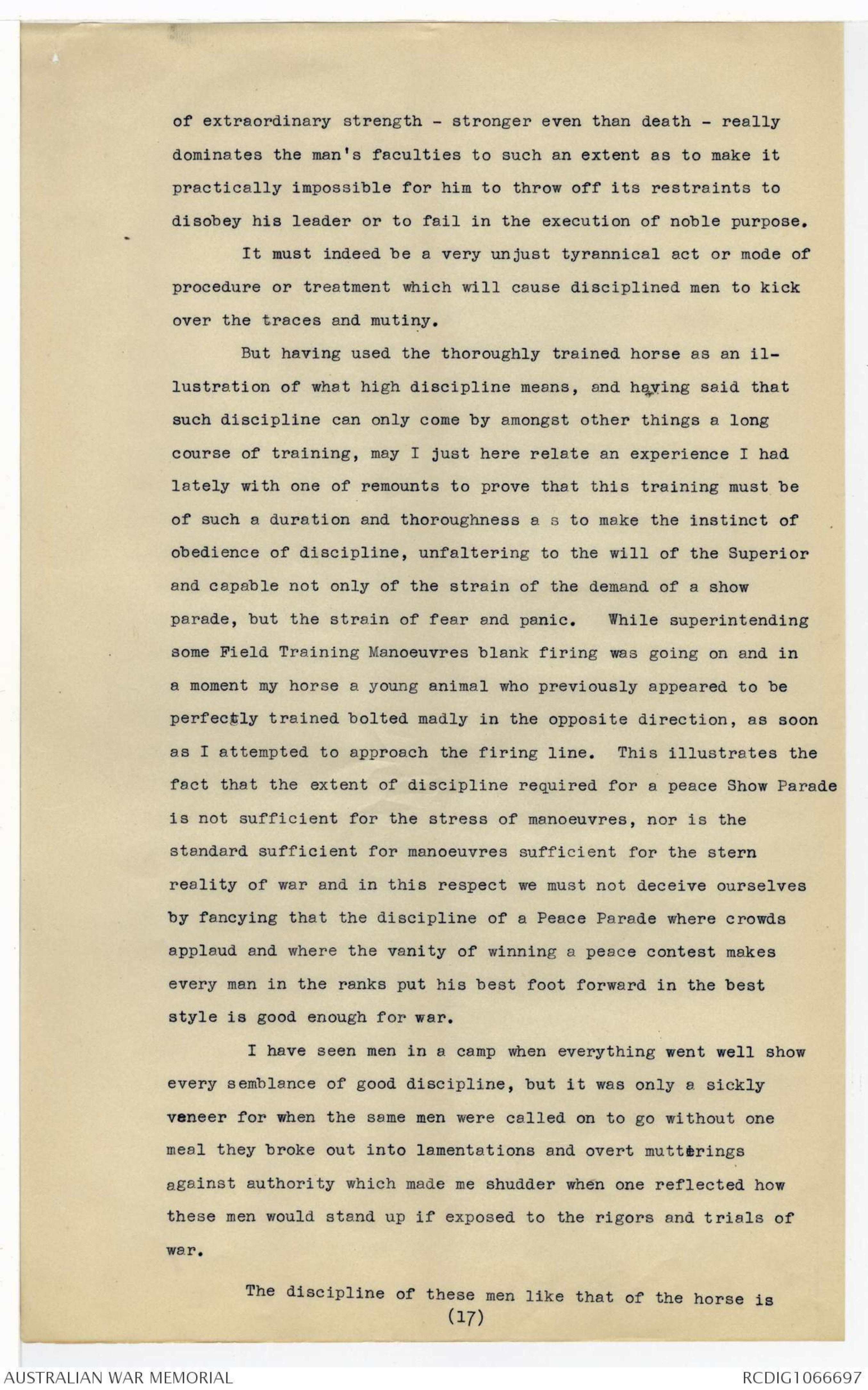
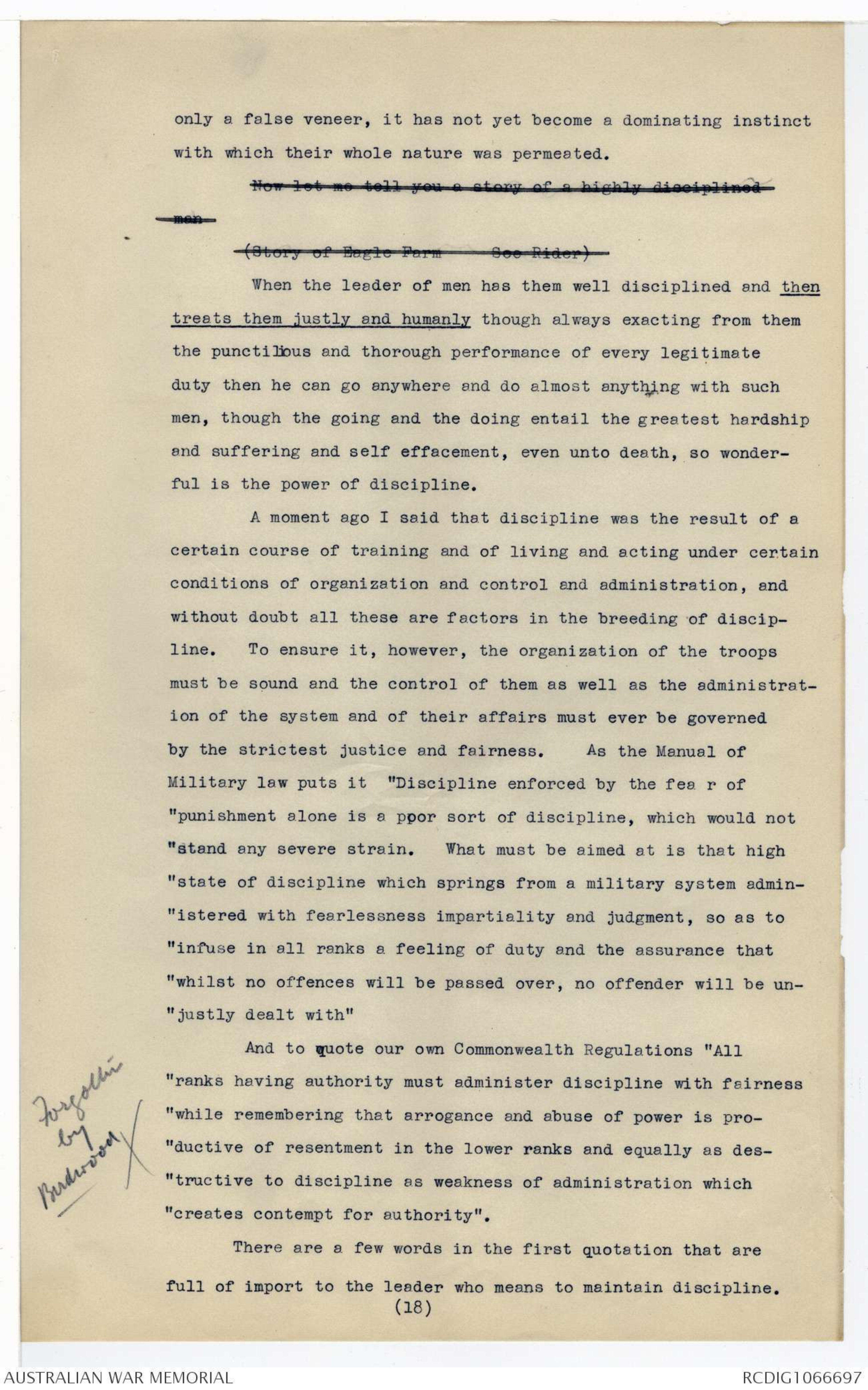
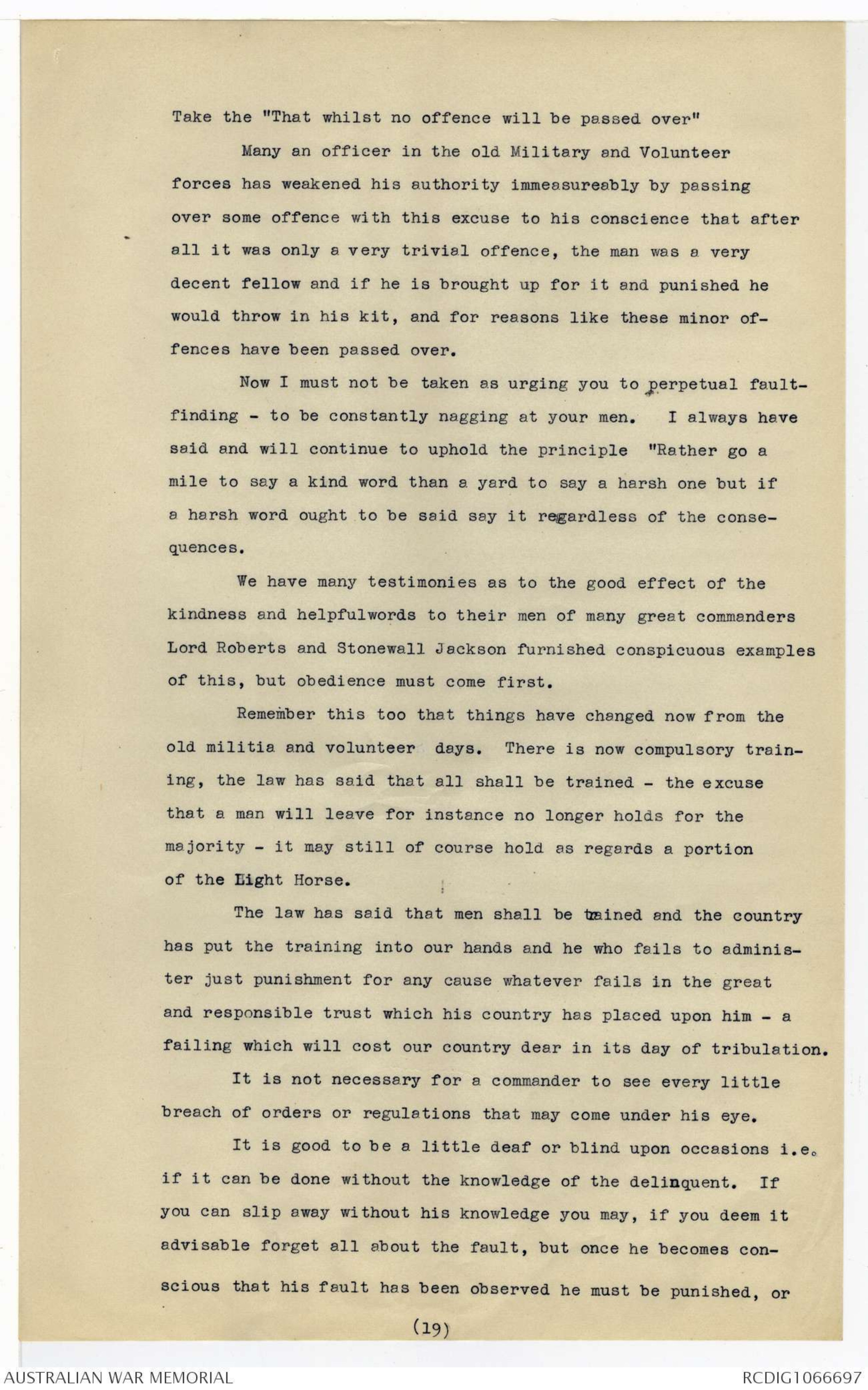
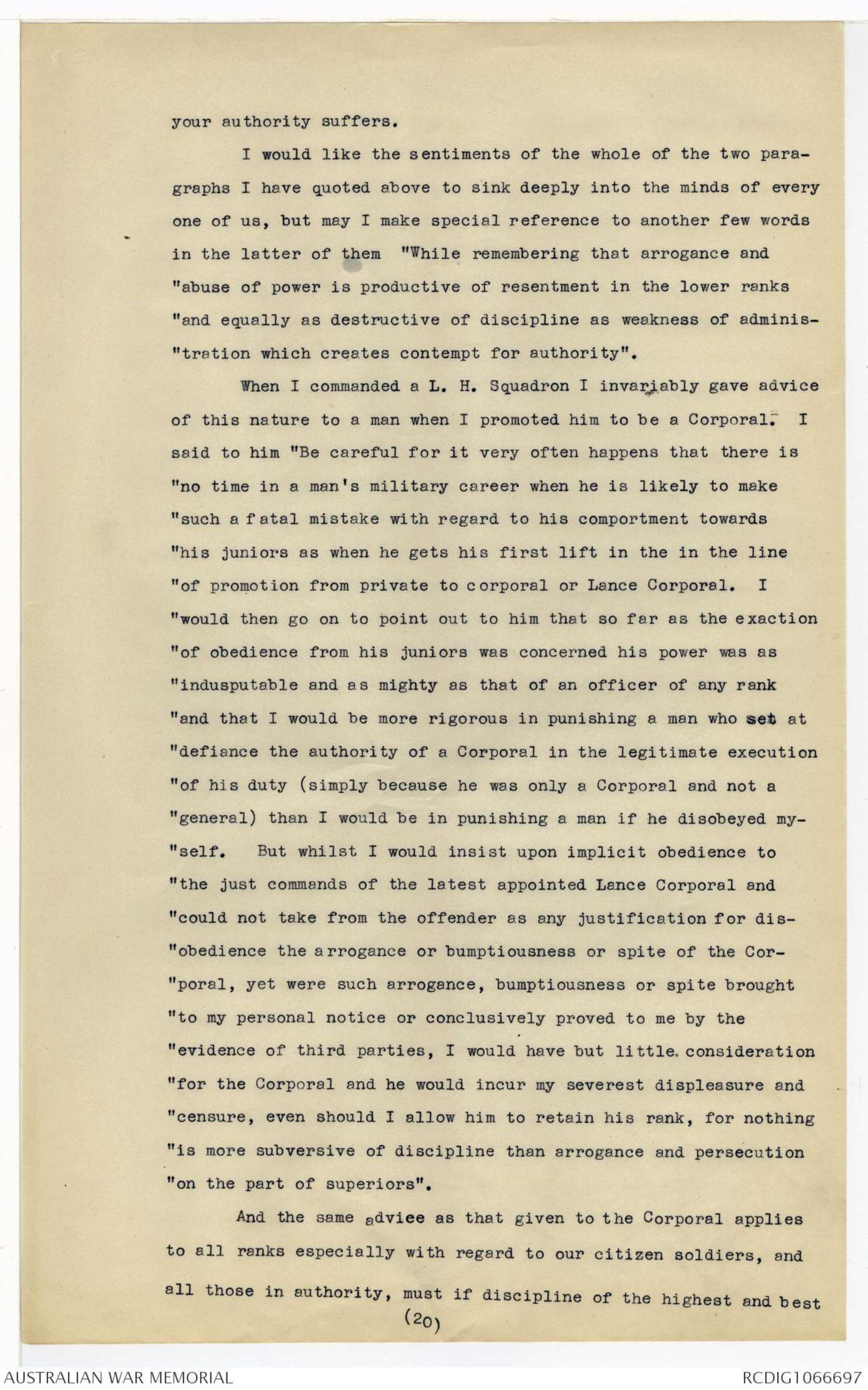
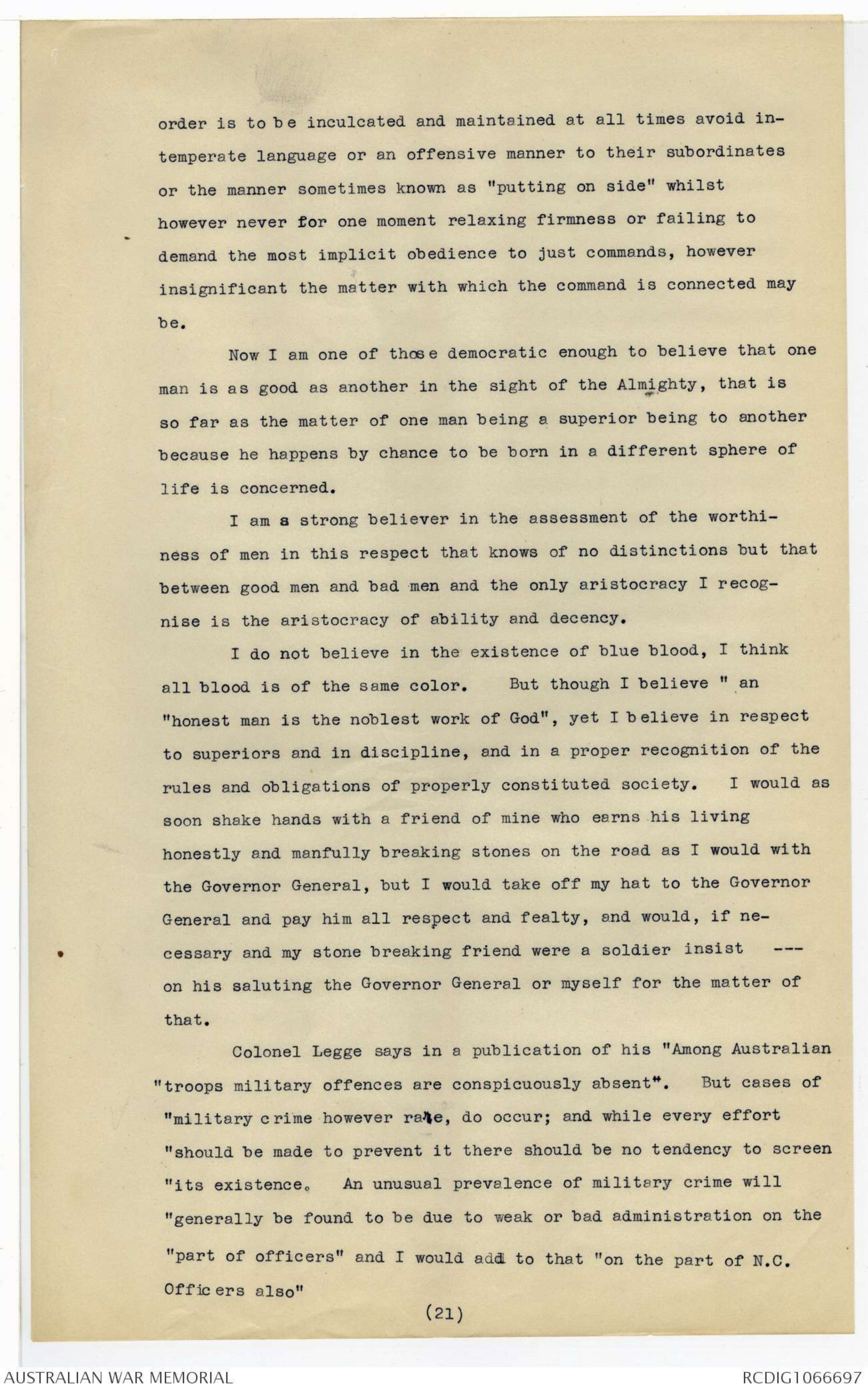
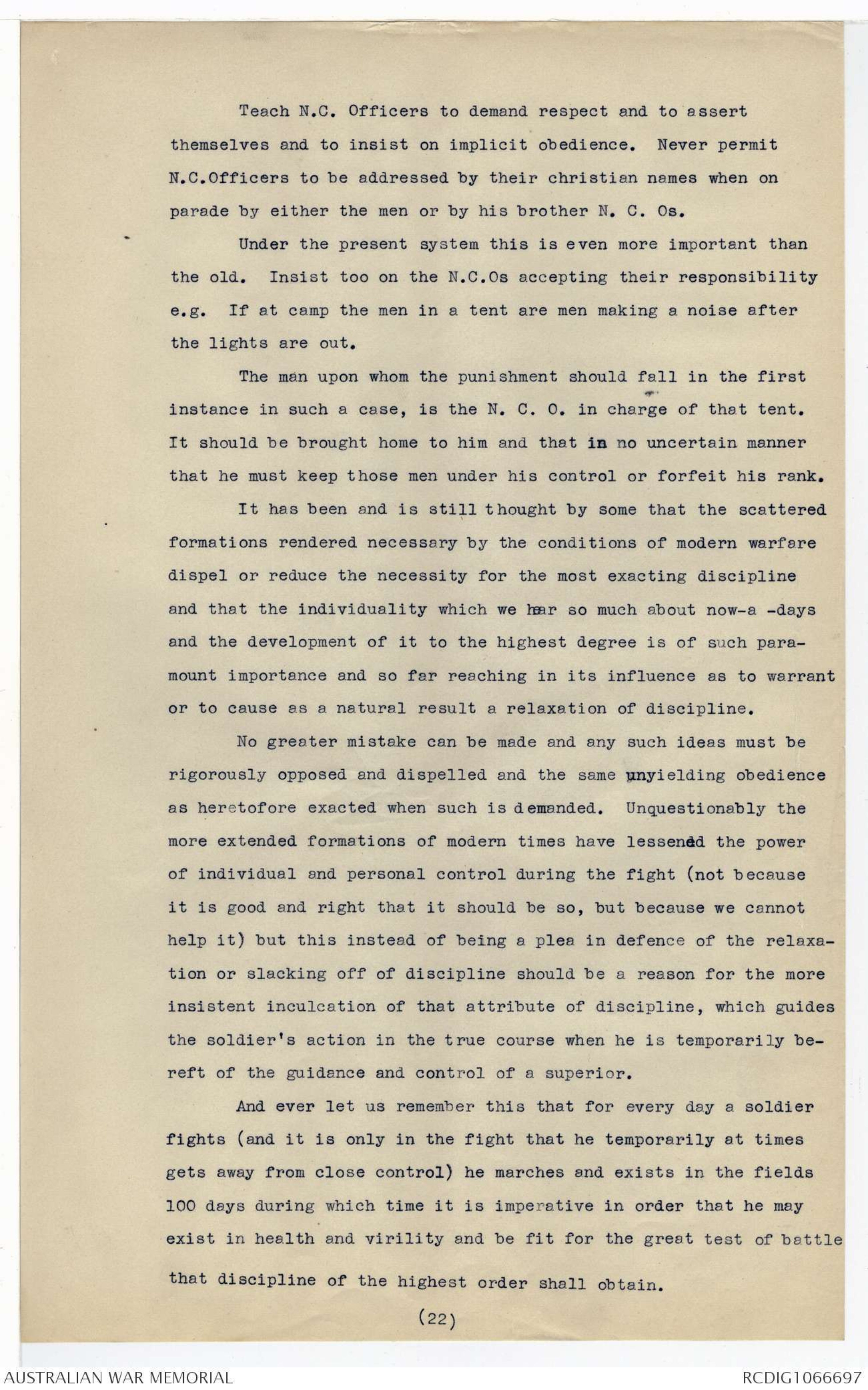
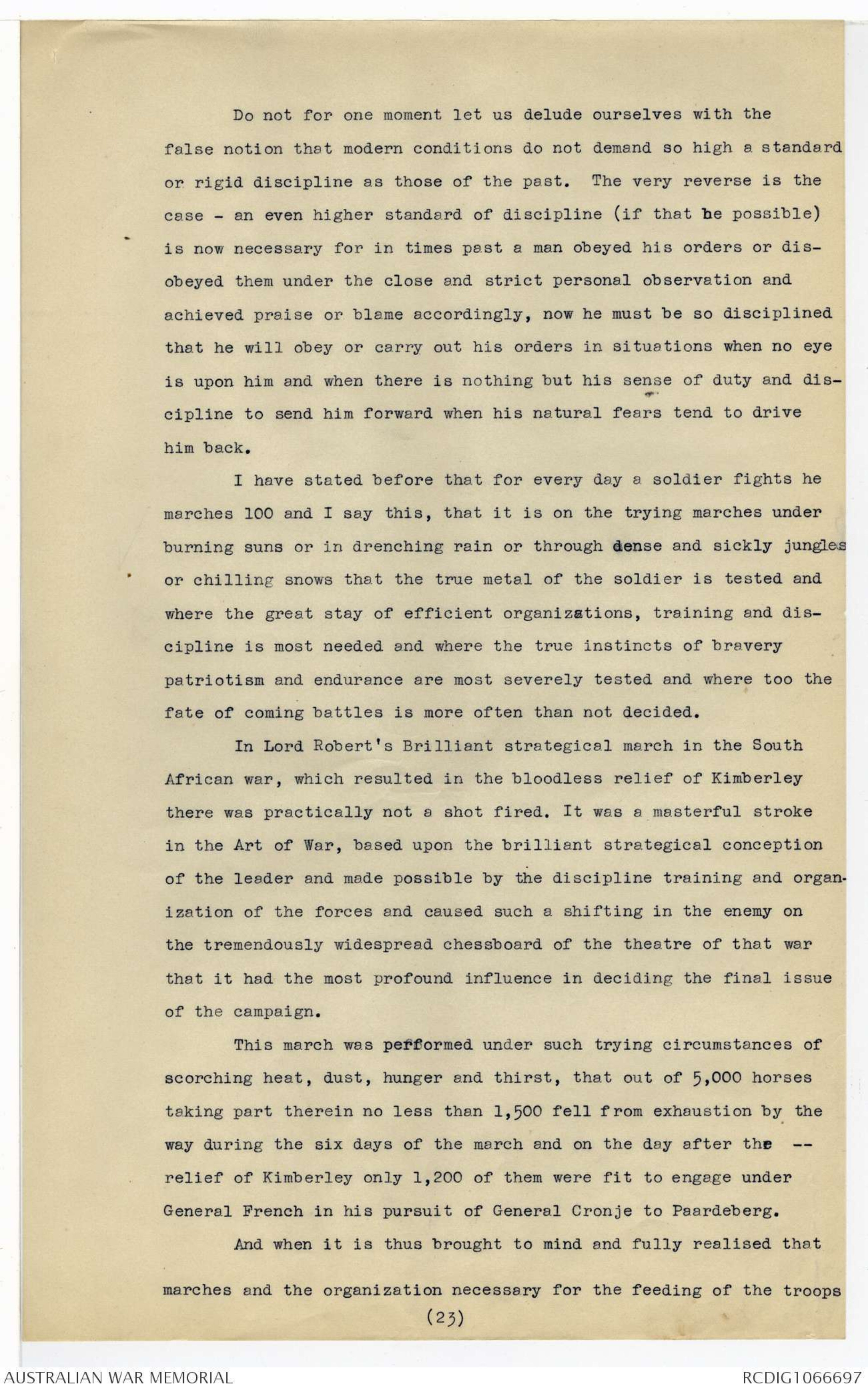
the necessary order be maintained. Discipline must go further
than this in its influences. The tests applied to it in war
are very hard ones. Discipline demands more than the observance
of a set of rules to ensure the maintenance of good order. It
also demands of the soldier, that he bear uncomplainingly the
severest trials of hunger and thirst and weariness and sickness
for the ultimate good of his country and that he shall unflinchingly
stake his life amidst the most appalling and abhorrent
dangers in order to vanquish the enemy. It demands of him something
extraordinary and must by its subtle and dominating
influence make the extraordinary demand so familiar to him,
that he considers it unavoidable and more than this that he considers
it the natural sacrifice that he should make.
I have often thought of this magic influence of discipline
and of its power over a man, though I must confess my inability
to describe into words really what it is in all its sublety
and wonderful power in fact, I believe that discipline in
all its far reaching influences is undescribable and is not
capable of a full definition or explanation by one human being
to another. Yet one man realises when he meets another disciplined
man and feels at once that there is an affinity and
mutual confidence between them and the common possession of a
faculty which neither can describe to his fellows and yet which
they know warrants one placing infinite reliance in the other
in times of crisis and danger.
Darwin says :- "The superiority which disciplined
"soldiers show over undisciplined masses is primarily the consequence
“of the confidence which each has in his comrades" and
Von der Golz dilating in the same strain says "With composure
"the disciplined soldier presents his breast to the bullets
"of the enemy being convinced that his disciplined comrades will
"do the same that his commanders are in the lead and he may not
"leave them in the lurch."
Discipline in its mysticism and difficulty of definition
is like "hands on a horse" Let two horsemen meet and let
them discuss between themselves some bad horseman and one will
(14)
probably say as is often the case :- "Oh he has no hands
"on a horse" and the other will agree and both will know exactly
what is meant, but I defy either of them or any living horseman
to convey in words exactly what that subtle controlling power is
which good horsemen possess over every movement, and over the
temperament of their horses through their hands or to take a
novice and by any instruction convey to him such a knowledge as
will enable him so to handle his reins as to acquire from the
theoretical knowledge which has been thus conveyed to him "good
hands on a horse". No, good hands only come from long training
and practice and eventually becomes an instinct (though an --
acquired one) in the man, indescribable in words; and when they
do come they exercise over the horse an unexplainable control and
influence which cannot be denied or opposed by the trained horse,
but which must be submitted to.
But some may say is this a true illustration of what
discipline is. Are you not rather using an illustration
of the power of the one who controls rather than of the discipline
which controls the one who yields himselt to that
control?
Yes! but now look at the horse.
Has it ever struck you how marvellous it is that a
beast like the horse, said to be seven times stronger than a
man, becomes under the magnetic influence of a good horseman
amenable to the slightest indication of will on the part of his
rider. It is not astonishing that a horse when madly, and
excitedly galloping is yet susceptible and yields to the
slightest pressure of the reins or of the knee, never failing
to answer to the merest touch of the hand and steering every
time as true even to an inch as a boat does to her rudder, just
as the rider may desire and indicate to him. What a confidence
in the unfailing discipline of the horse has his rider
when he will race full split through thick timber with feelings
of safety when he knows full well a momentary lapse of discipline
on the part of the horse may mean his brains being dashed
out.
(15)
There is no physical force exerted to compel the horse
to go in the direction you require, in fact, did he determine
to oppose your wishes, did his discipline break down, you could not
by force compel him to comply with them.
In the marvellous discipline of the horse familiarity
lesssons not the wonderment even to the most constant rider.
And so it is with discipline in the man. You cannot teach discipline
in a week. You cannot describe or teach it to a recruit
by words or by any theoretical code. It is a subtle de-
dominating influence causing when required his utter self effacement,
even unto death and which comes into a man's nature
as the result of a certain course of training, both mental and
physical and as the result of living and acting under certain
conditions of organization and control. Administration and
inspiring influences and which eventually when he becomes what
we call a well disciplined man, practically compels him instinctively
and almost unfalteringly to submit, as the definition
has it to the will of a superior and to be ever true to his salt
no matter what the consequences.
There is no physical force applied to compel the disciplined
man to at all times and in all circumstances to do as
required and as he should do as a man, but he is dominated by
what as I say has become almost an instinct of obedience and sub-ordination
to a higher will, or when the influence of that higher
will is not being immediately exercised, then to what he knows to
be his duty and of unfailing loyalty to the cause he has espoused
and from the power of which instinct his nature cannot
revolt except under the most unfair and harsh treatment, which
treatment is, to my mind, akin to the mauling treatment which an
incapable or a cruel abusive horseman gives his horse, and which
causes it to revolt and refuse to obey the artificial instinct
of obedience or to fail in the reliability which has been by his
training engendered in his very nature.
To my mind discipline when properly inculcated and
imbued in a soldier's nature becomes, as I have said an instinct,
which, unless the forces contending against that instinct are
(16)
of extraordinary strength - stronger even than death - really
dominates the man's faculties to such an extent as to make it
practically impossible for him to throw off its restraints to
disobey his leader or to fail in the execution of noble purpose.
It must indeed be a very unjust tyrannical act or mode of
procedure or treatment which will cause disciplined men to kick
over the traces and mutiny.
But having used the thoroughly trained horse as an illustration
of what high discipline means, and having said that
such discipline can only come by amongst other things a long
course of training, may I just here relate an experience I had
lately with one of remounts to prove that this training must be
of such a duration and thoroughness as to make the instinct of
obedience of discipline, unfaltering to the will of the Superior
and capable not only of the strain of the demand of a show
parade, but the strain of fear and panic. While superintending
some Field Training Manoeuvres blank firing was going on and in
a moment my horse a young animal who previously appeared to be
perfectly trained bolted madly in the opposite direction, as soon
as I attempted to approach the firing line. This illustrates the
fact that the extent of discipline required for a peace Show Parade
is not sufficient for the stress of manoeuvres, nor is the
standard sufficient for manoeuvres sufficient for the stern
reality of war and in this respect we must not deceive ourselves
by fancying that the discipline of a Peace Parade where crowds
applaud and where the vanity of winning a peace contest makes
every man in the ranks put his best foot forward in the best
style is good enough for war.
I have seen men in a camp when everything went well show
every semblance of good discipline, but it was only a sickly
veneer for when the same men were called on to go without one
meal they broke out into lamentations and overt mutterings
against authority which made me shudder when one reflected how
these men would stand up if exposed to the rigors and trials of
war.
The discipline of these men like that of the horse is
(17)
only a false veneer, it has not yet become a dominating instinct
with which their whole nature was permeated.Now let me tell you a story of a highly disciplinedman(Story of Eagle Farm See Rider)
When the leader of men has them well disciplined and then
treats them justly and humanly though always exacting from them
the punctilious and thorough performance of every legitimate
duty then he can go anywhere and do almost anything with such
men, though the going and the doing entail the greatest hardship
and suffering and self effacement, even unto death, so wonderful
is the power of discipline.
A moment ago I said that discipline was the result of a
certain course of training and of living and acting under certain
conditions of organization and control and administration, and
without doubt all these are factors in the breeding of discipline.
To ensure it, however, the organization of the troops
must be sound and the control of them as well as the administration
of the system and of their affairs must ever be governed
by the strictest justice and fairness. As the Manual of
Military law puts it "Discipline enforced by the fear of
"punishment alone is a poor sort of discipline, which would not
"stand any severe strain. What must be aimed at is that high
"state of discipline which springs from a military system administered
"with fearlessness impartiality and judgment, so as to
"infuse in all ranks a feeling of duty and the assurance that
"whilst no offences will be passed over, no offender will be unjustly
"dealt with"
And to quote our own Commonwealth Regulations "All
[*Forgotten
by
Birdwood x*]
"ranks having authority must administer discipline with fairness
"while remembering that arrogance and abuse of power is productive
"of resentment in the lower ranks and equally as destructive
"to discipline as weakness of administration which
"creates contempt for authority."
There are a few words in the first quotation that are
full of import to the leader who means to maintain discipline.
(18)
Take the "That whilst no offence will be passed over"
Many an officer in the old Military and Volunteer
forces has weakened his authority immeasureably by passing
over some offence with this excuse to his conscience that after
all it was only a very trivial offence, the man was a very
decent fellow and if he is brought up for it and punished he
would throw in his kit, and for reasons like these minor offences
have been passed over.
Now I must not be taken as urging you to perpetual fault-finding
- to be constantly nagging at your men. I always have
said and will continue to uphold the principle "Rather go a
mile to say a kind word than a yard to say a harsh one but if
a harsh word ought to be said say it regardless of the consequences.
We have many testimonies as to the good effect of the
kindness and helpfulwords to their men of many great commanders
Lord Roberts and Stonewall Jackson furnished conspicuous examples
of this, but obedience must come first.
Remember this too that things have changed now from the
old militia and volunteer days. There is now compulsory training,
the law has said that all shall be trained - the excuse
that a man will leave for instance no longer holds for the
majority - it may still of course hold as regards a portion
of the Light Horse.
The law has said that men shall be trained and the country
has put the training into our hands and he who fails to administer
just punishment for any cause whatever fails in the great
and responsible trust which his country has placed upon him - a
failing which will cost our country dear in its day of tribulation.
It is not necessary for a commander to see every little
breach of orders or regulations that may come under his eye.
It is good to be a little deaf or blind upon occasions i.e.
if it can be done without the knowledge of the delinquent. If
you can slip away without his knowledge you may, if you deem it
advisable forget all about the fault, but once he becomes conscious
that his fault has been observed he must be punished, or
(19)
your authority suffers.
I would like the sentiments of the whole of the two paragraphs
I have quoted to sink deeply into the minds of every
one of us, but may I make special reference to another few words
in the latter of them "While remembering that arrogance and
"abuse of power is productive of resentment in the lower ranks
"and equally as destructive of discipline as weakness of administration
"which creates contempt for authority".
When I commanded a L. H. Squadron I invariably gave advice
of this nature to a man when I promoted him to be a Corporal. I
said to him "Be careful for it very often happens that there is
"no time in a man's military career when he is likely to make
"such a fatal mistake with regard to his comportment towards
"his juniors as when he gets his first lift in the in the line
"of promotion from private to corporal or Lance Corporal. I
"would then go on to point out to him that so far as the exaction
"of obedience from his juniors was concerned his power was as
"indusputable and as mighty as that of an officer of any rank
"and that I would be more rigorous in punishing a man who set at
"defiance the authority of a Corporal in the legitimate execution
"of his duty (simply because he was only a Corporal and not a
"general) than I would be in punishing a man if he disobeyed myself.
"But whilst I would insist on implicit obedience to
"the just commands of the latest appointed Lance Corporal and
"could not take from the offender as any justification for disobedience
"the arrogance or bumptiousness or spite of the Corporal,
"yet were such arrogance, bumptiousness or spite brought
"to my personal notice or conclusively proved to me by the
"evidence of third parties, I would have but little consideration
"for the Corporal and he would incur my severest displeasure and
"censure, even should I allow him to retain his rank, for nothing
"is more subversive of discipline than arrogance and persecution
"on the part of superiors".
And the same advice as that given to the Corporal applies
to all ranks especially with regard to our citizen soldiers, and
all those in authority, must if discipline of the highest and best
(20)
order is to be inculcated and maintained at all times avoid intemperate
language or an offensive manner to their subordinates
or the manner sometimes known as "putting on side" whilst
however never for one moment relaxing firmness or failing to
demand the most implicit obedience to just commands, however
insignificant the matter with which the command is connected may
be.
Now I am one of those democratic enough to believe that one
man is as good as another in the sight of the Almighty, that is
so far as the matter of one man being a superior being to another
because he happens by chance to be born in a different sphere of
life is concerned.
I am a strong believer in the assessment of the worthiness
of men in this respect that knows of no distinctions but that
between good men and bad men and the only aristocracy I recognise
is the aristocracy of ability and decency.
I do not believe in the existence of blue blood, I think
all blood is of the same color. But though I believe " an
"honest man is the noblest work of God", yet I believe in respect
to superiors and in discipline, and in a proper recognition of the
rules and obligations of properly constituted society. I would as
soon shake hands with a friend of mine who earns his living
honestly and manfully breaking stones on the road as I would with
the Governor General, but I would take off my hat to the Governor
General and pay him all respect and fealty, and would, if necessary
and my stone breaking friend were a soldier insist ---
on his saluting the Governor General or myself for the matter of
that.
Colonel Legge says in a publication of his "Among Australian
"troops military offences are conspicuously absent". But cases of
"military crime however rare, do occur; and while every effort
"should be made to prevent it there should be no tendency to screen
"its existence. An unusual prevalence of military crime will
"generally be found to be due to weak or bad administration on the
"part of officers" and I would add to that "on the part of N.C.
Officers also"
(21)
Teach N.C. Officers to demand respect and to assert
themselves and to insist on implicit obedience. Never permit
N.C.Officers to be addressed by their christian names when on
parade by either the men or by his brother N. C. Os.
Under the present system this is even more important than
the old. Insist too on the N.C.Os accepting their responsibility
e.g. If at camp the men in a tent are men making a noise after
the lights are out.
The man upon whom the punishment should fall in the first
instance in such a case, is the N. C. O. in charge of that tent.
It should be brought home to him and that in no uncertain manner
that he must keep those men under his control or forfeit his rank.
It has been and is still thought by some that the scattered
formations rendered necessary by the conditions of modern warfare
dispel or reduce the necessity for the most exacting discipline
and that the individuality which we hear so much about now-a -days
and the development of it to the highest degree is of such paramount
importance and so far reaching in its influence as to warrant
or to cause as a natural result a relaxation of discipline.
No greater mistake can be made and any such ideas must be
rigorously opposed and dispelled and the same unyielding obedience
as heretofore exacted when such is demanded. Unquestionably the
more extended formations of modern times have lessened the power
of individual and personal control during the fight (not because
it is good and right that it should be so, but because we cannot
help it) but this instead of being a plea in defence of the relaxation
or slacking off of discipline should be a reason for the more
insistent inculcation of that attribute of discipline, which guides
the soldier's action in the true course when he is temporarily bereft
of the guidance and control of a superior.
And ever let us remember this that for every day a soldier
fights (and it is only in the fight that he temporarily at times
gets away from close control) he marches and exists in the fields
100 days during which time it is imperative in order that he may
exist in health and virility and be fit for the great test of battle
that discipline of the highest order shall obtain.
(22)
Do not for one moment let us delude ourselves with the
false notion that modern conditions do not demand so high a standard
or rigid discipline as those of the past. The very reverse is the
case - an even higher standard of discipline (if that be possible)
is now necessary for in times past a man obeyed his orders or disobeyed
them under the close and strict personal observation and
achieved praise or blame accordingly, now he must be so disciplined
that he will obey or carry out his orders in situations when no eye
is upon him and when there is nothing but his sense of duty and discipline
to send him forward when his natural fears tend to drive
him back.
I have stated before that for every day a soldier fights he
marches 100 and I say this, that it is on the trying marches under
burning suns or in drenching rain or through dense and sickly jungles
or chilling snows that the true metal of the soldier is tested and
where the great stay of efficient organizations, training and discipline
is most needed and where the true instincts of bravery
patriotism and endurance are most severely tested and where too the
fate of coming battles is more often than not decided.
In Lord Robert's Brilliant strategical march in the South
African war, which resulted in the bloodless relief of Kimberley
there was practically not a shot fired. It was a masterful stroke
in the Art of War, based upon the brilliant strategical conception
of the leader and made possible by the discipline training and organization
of the forces and caused such a shifting in the enemy on
the tremendously widespread chessboard of the theatre of that war
that it had the most profound influence in deciding the final issue
of the campaign.
This march was performed under such trying circumstances of
scorching heat, dust, hunger and thirst, that out of 5,000 horses
taking part therein no less than 1,500 fell from exhaustion by the
way during the six days of the march and on the day after the --
relief of Kimberley only 1,200 of them were fit to engage under
General French in his pursuit of General Cronje to Paardeberg.
And when it is thus brought to mind and fully realised that
marches and the organization necessary for the feeding of the troops
(23)
 Deb Parkinson
Deb ParkinsonThis transcription item is now locked to you for editing. To release the lock either Save your changes or Cancel.
This lock will be automatically released after 60 minutes of inactivity.